Data-driven working is hampered by data quality challenges
The DDMO 2024 shows that the availability and quality of data is still one of the biggest challenges for many organizations to work in a data-driven way: in 33% of organizations, data and insights are still either available to a limited degree or not at all. 24% have placed data quality in their top 3 biggest challenges. As in previous years, the lack of budget (the biggest challenge at 28%) also seems to be at the root of the challenge to work in a more data-driven manner, with no improvement visible in this regard either.
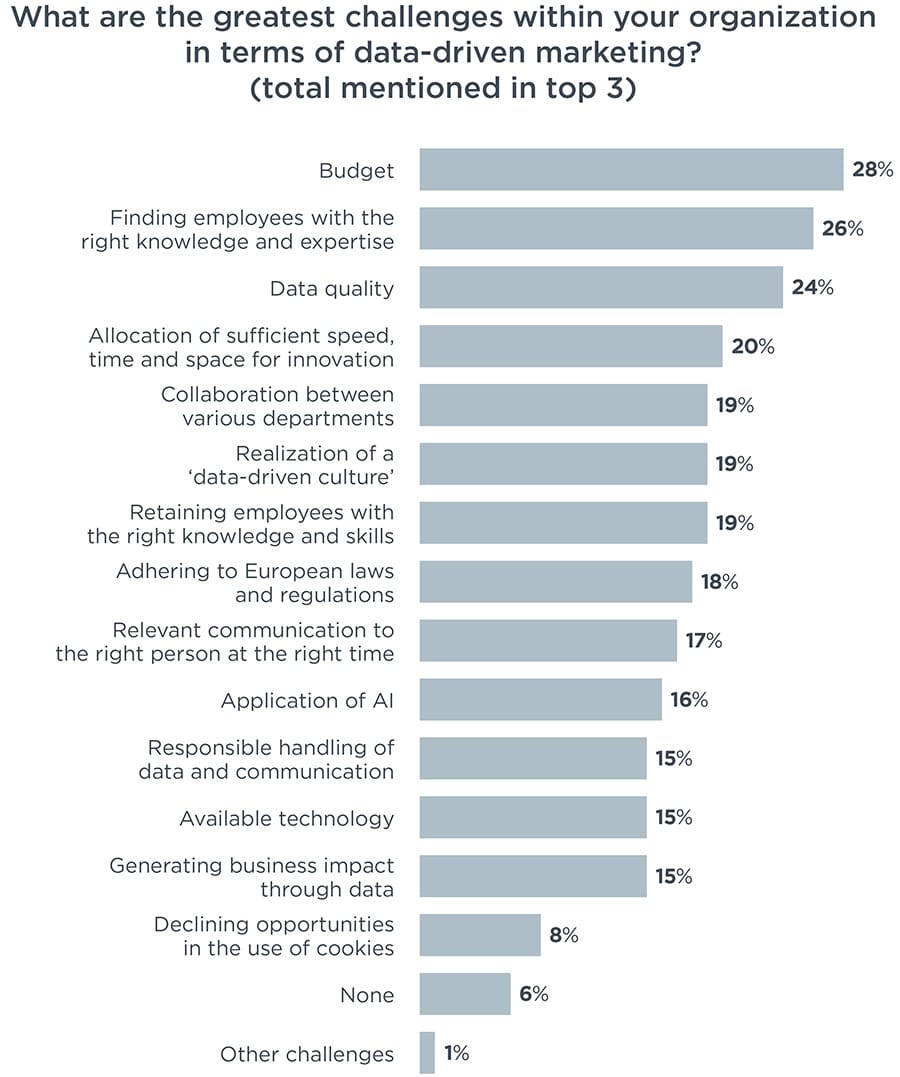
Despite the fact that we live in a world that is increasingly reliant on data, many organizations are still looking for a satisfactory symbiosis between people, processes and technology, with enough time and priority (such as budget) to enable more data-driven working. We are now also seeing this in the use of more complex AI applications: data quality is an impeding factor and exposes a fundamental problem.
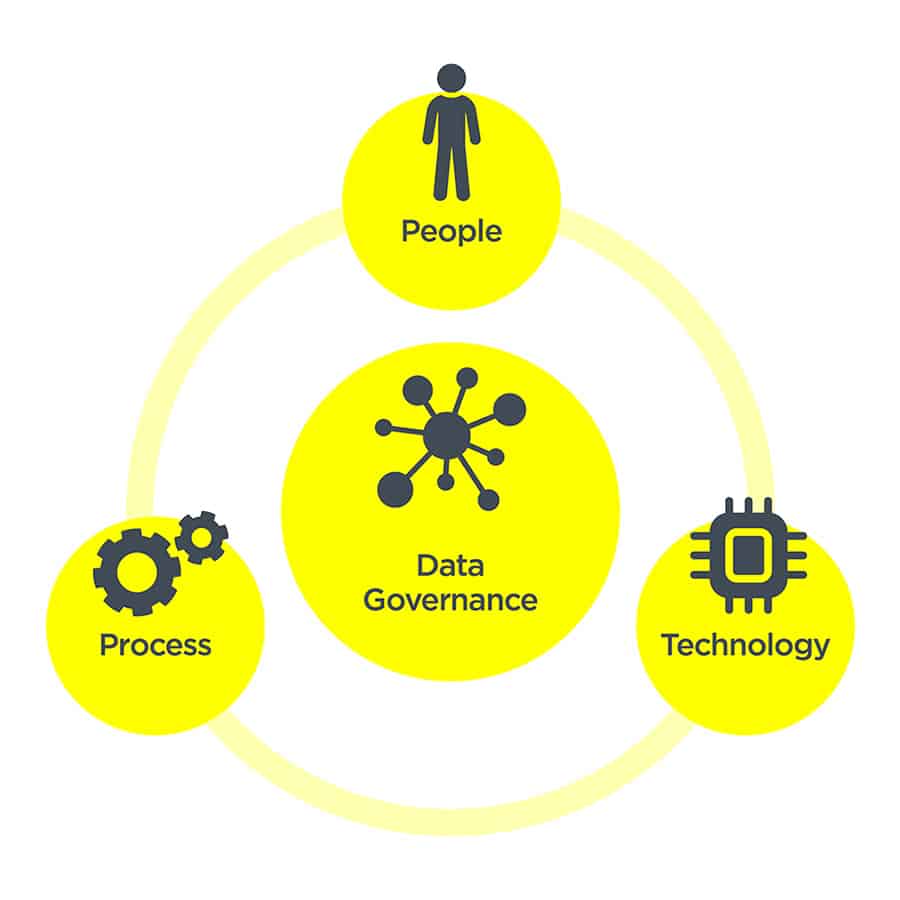
Data Governance as a building block for data quality
Data quality is quite a broad concept, and therefore the concept of ‘Data Governance’ is a good framework for explaining this challenge from the three perspectives of People, Processes and Technology (this model has its origins in Harold Leavitt’s “Applied Organisation Change in Industry“, 1965). Data quality is therefore not only about the technical aspect, but also about cultivating a data-driven culture whereby good cooperation between the business and byte sides of organizations is crucial.
1. People
For the second year running, the DDMO has showed that it is important for organizations in the marketing sector to pay attention to maintaining the knowledge and skills of employees: 72% cite it as the most important topic in the future of the marketing profession, followed by attention to skills and individual characteristics of employees (67%). Finding and retaining these employees with the right knowledge and skills is a logical matter for concern, due to labor market shortages and rapid technological developments.
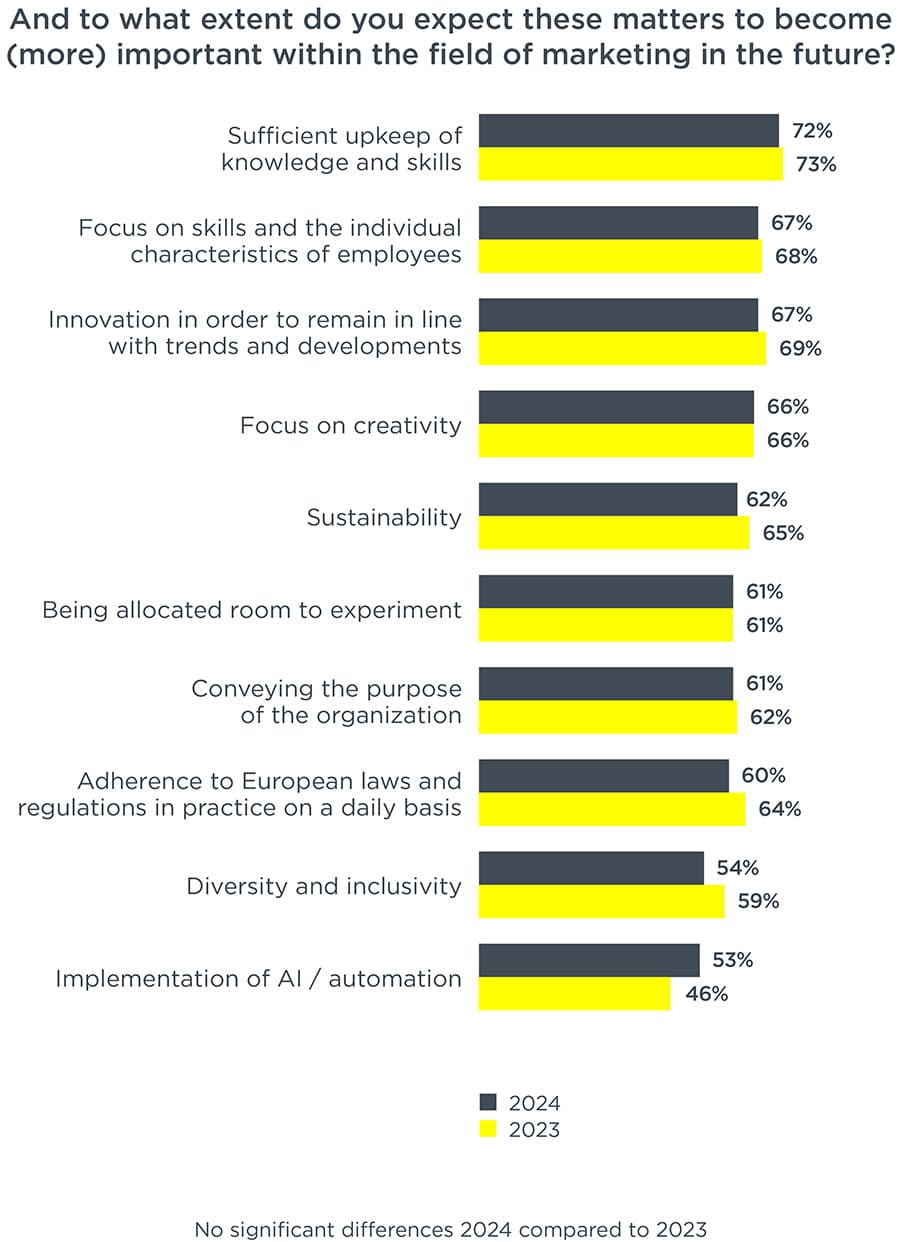
In general, the sector representation in the survey does not see an immediate challenge to the presence of knowledge and skills in the field of data: only 20% state this as the most valuable skill to possess in their position. Basically, these are hard skills that are easy to learn. The challenge lies mainly in the soft skills of employees: collaboration and communication skills, among other things, are increasingly important skills to develop, and are seen as the most valuable within the position. Collaboration is perceived as the most valuable by 32%, and communication skills by 40%.
Are you looking to find out more about the importance of soft skills? We will discuss this in more detail in an upcoming in-depth article.
2. Technology
Another remarkable outcome of the DDMO 2024 is that there are few discernible changes in terms of technology in the use of data tooling. For example, 86% of industry representatives still do not use a customer data platform (CDP), and other data solutions such as data warehouses (used by 22%) and data lakes (used by 12%) are also used in a relatively limited manner.
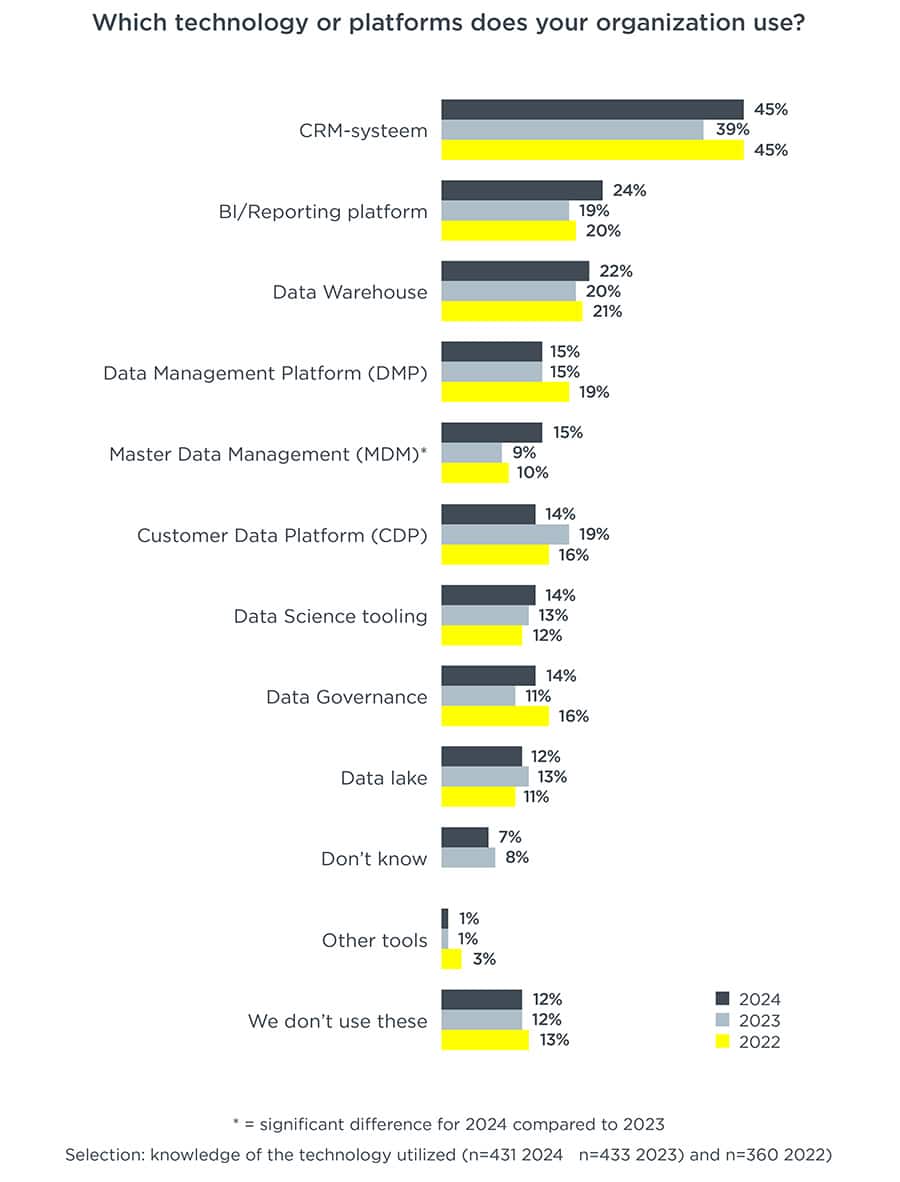
A logical consequence of the lack of the aforementioned tooling within organizations is that data is generally available in a fragmented manner, and it is difficult to have a central customer profile that can also be put to omnichannel use. As a result, there is also relatively low utilization of personalization on organizations’ own mobile apps and websites.
Are you looking to know more about data availability, quality and applications? In a later article in this series, we will return to this subject, and discuss the challenges facing organizations in the marketing sector in terms of data and insight, and the technology that is applied by some.
3. Process
The processes within the model can be seen as a binding agent between ‘people’ and ’technology’. In the DDMO 2024, it is noticeable within larger firms that there is often an imbalance between the business and byte side of organizations. The business side is more aware of the processing of the data than the byte side of the outfit. The byte side on the other hand is more familiar with what data is being collected and the methods utilized, but apparently the context about how data is ultimately used appears to be lacking.
Remarkably, across different insights, medium-sized companies seem to have fewer challenges in obtaining good insights: they have less complexity, and a more linear organizational hierarchy, but nevertheless have the technical capabilities. This just goes to show that the ‘people’ perspective is a major factor, whereby roles and responsibilities need to be properly defined with clear process owners and lines of communication. The aforementioned analytical skills and communication abilities of employees are of key importance in this regard.
So, what about AI?
In the DDMO 2024, we see that AI is most often used in relatively low-threshold applications such as content creation (applied by 61% to a greater or lesser extent) and digital marketing (applied by 60% to a greater or lesser extent). Remarkably, despite the rapid technological advances in AI, more complex implementation remains limited – especially where the use of in-house data in so-called self-learning models within applications for Conversational AI, for example is concerned (with 45% (almost) not implementing this).
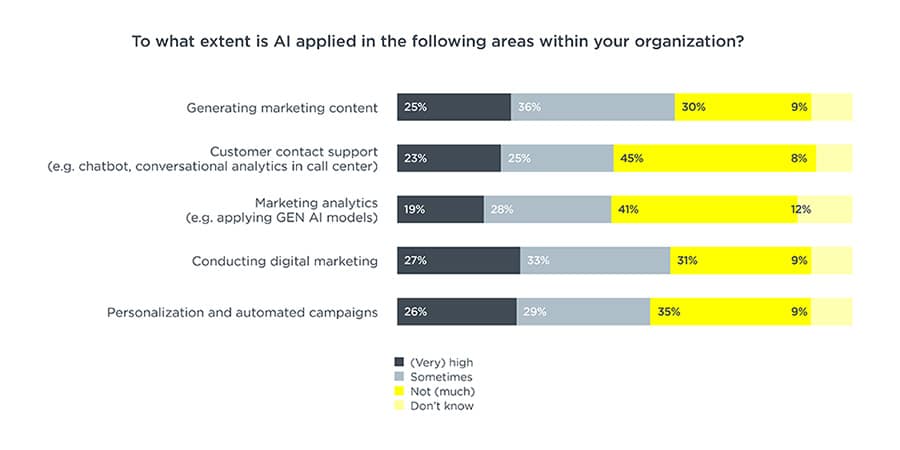
Here, too, there are challenges concerning data quality: without good data, the likelihood of errors is high, and this entails that many organizations are discovering the possibilities and impossibilities of AI step by step.
Are you looking to know more about the current use of AI? In a later article in this series, we will discuss this in more detail, including the associated challenges.
About the 2024 Data-Driven Marketing Survey (DDMO)
The DDMO is an independent initiative of the DDMA trade association and the DDMA Committee on Data, Decision & Engagement. The annual survey maps out how the marketing sector in the Netherlands processes data and uses (customer) data, with the aim of providing insight and advice into how data-driven the marketing sector is and where opportunities and challenges lie.
In three deep dives, the most important insights of the DDMO 2024 were further elaborated. The first deep dive article will discuss the availability, quality and application of data by organizations within the marketing sector, followed by deep dive articles on the importance of soft skills within the marketing sector, as well as the current application and challenges of AI.
Research accountability
Method and collaboration
Quantitative research, conducted through an online survey in June and July 2024, in collaboration with research agency GfK.
Target group and sample
The sample consists of 520 Dutch people working within the marketing sector, recruited through the GfK panel, who answered positively to the question of whether they mainly perform marketing-related activities. In addition, 88 respondents from the DDMA constituency participated. The results mentioned are only based on the target group (n=506), unless explicitly stated otherwise.
Business & Byte target groups
Within the DDMO results, specific attention is paid to two specific sub-target groups: the business and byte target group, based on the role description of the research target group. The business side of organizations (n=178) includes roles such as marketers, product owners, marketing managers or coordinators, and the byte side (n=69) includes roles such as analysts, developers, programmers, data scientists or engineers.
Significance interpretation
In the case of differences in results between two or more groups, the significance was tested with a standard reliability of 95%. Significant differences are indicated by an *. Questions where fewer than 30 observations were available will not be indicated by percentages.
Authors
Ook interessant

DDMA Barometer 2025 – Consumentenaandacht raakt op: van digitale overload naar betekenisvolle marketing

AI in marketing: van praten naar doen – hoe je écht aan de slag gaat






